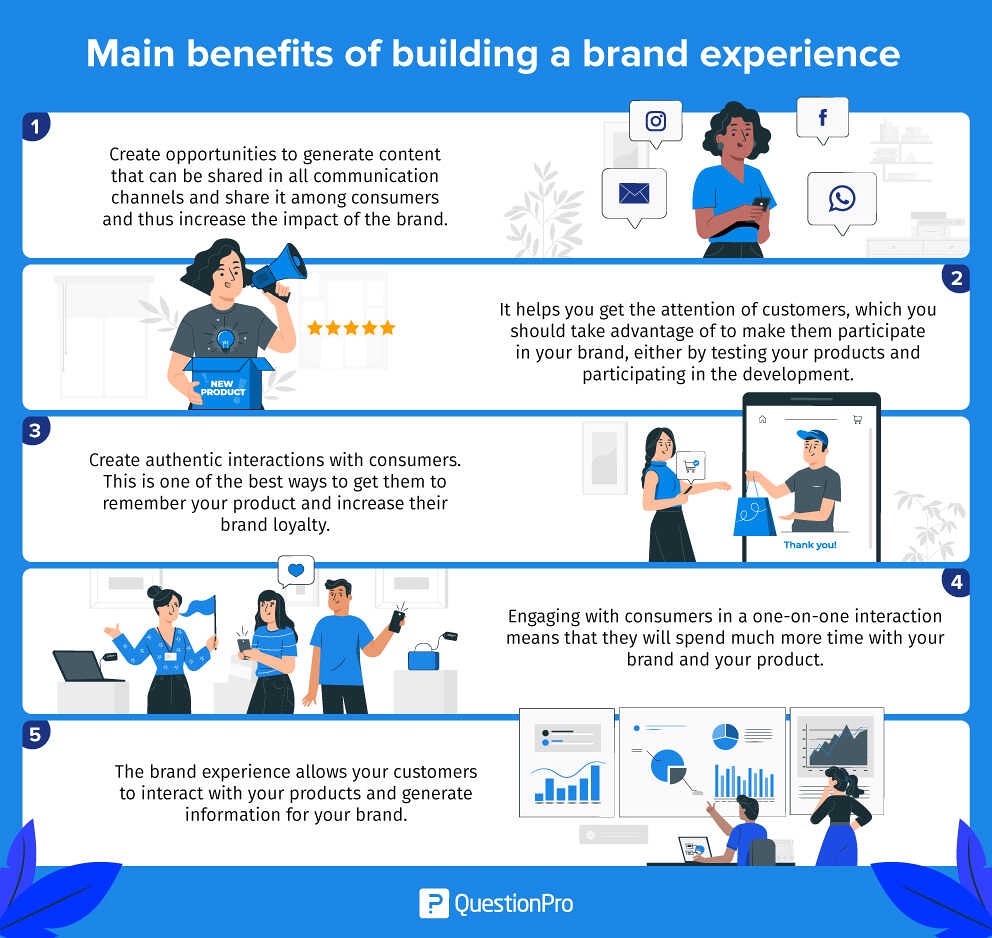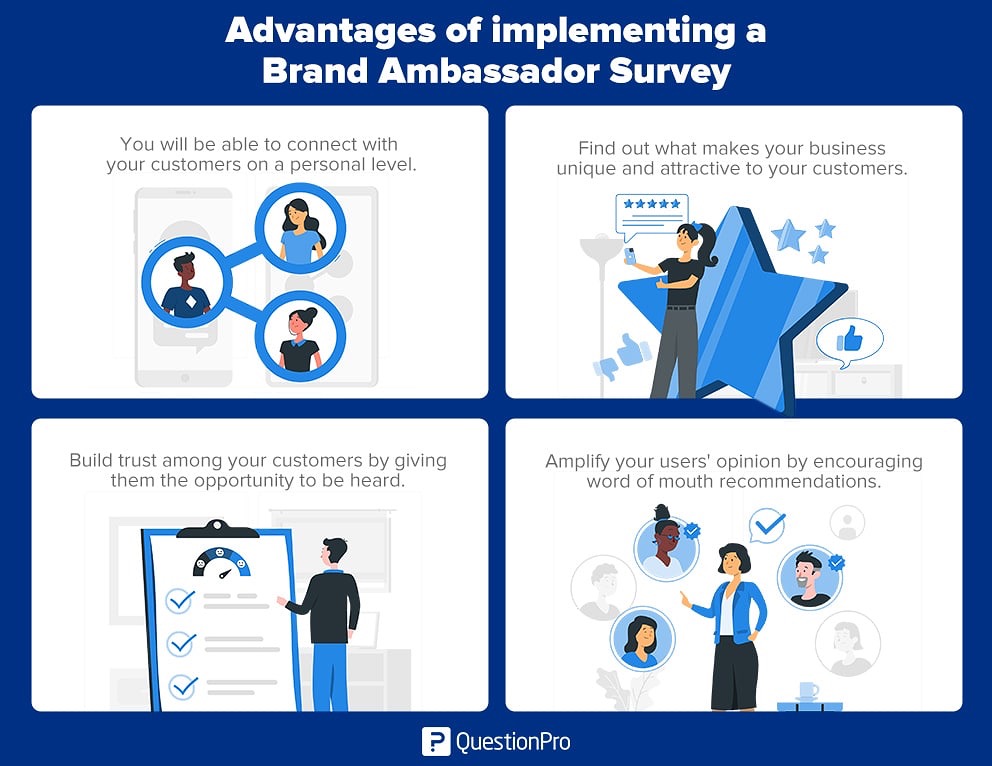Brand Experience Management
Markentreue kommt nicht von alleine, auch dann nicht, wenn Sie herausragende Produkte anbieten. Denn auch das Markenerlebnis spielt eine bedeutende Rolle. Lesen Sie, warum es wichtig ist, Markenerlebnisse zu schaffen, regelmäßig Brand-Tracking-Studien durchzuführen, Markenbotschafter zu gewinnen und eine Brand Community zu nutzen.
Markentreue & Brand Experience
- 1 Was bedeutet Markentreue bzw. Markenloyalität?
- 2 5 irrige Annahmen zum Thema Markentreue und Markenerlebnis
- 3 Und so steigern Sie tatsächlich die Markentreue und das Markenerlebnis (Brand Experience)
- 4 1:1 Live Online-Präsentation: Markentreue steigern mit der Brand Experience Management Plattform von QuestionPro!
- 5 Software für Marktforschung und Brand Experience Management jetzt 10 Tage kostenlos testen!
Was bedeutet Markentreue bzw. Markenloyalität?
Markentreue, auch Markenloyalität genannt, ist das, was ein Unternehmen erreicht hat, wenn seine Kunden Produkt oder eine Dienstleistung aufgrund ihres Wertes und emotionalen Mehrwerts wiederholt kaufen, ohne dabei in Betracht zu ziehen, Alternativen zu erwerben.. Dies ergibt sich aus dem Vertrauen, das das Unternehmen ihnen entgegenbringt, und aus der Art und Weise, wie sehr Kunden mit dem Unternehmen bzw. mit der Marke verbunden sind.
Die Markentreue ist das Resultat zahlreicher Variablen, von denen einige kontrolliert werden können und andere wiederum nicht.nicht. Um zu verstehen, welche Variablen sich auf den Grad der Kundenloyalität positiv auswirken, müssen Unternehmen die verschiedenen Berührungspunkte zwischen Kunden und Marke analysieren und bewerten. Dies geschieht mithilfe des Brand Experience Managements, also der bewußten Beeinflussung des Markenerlebnisses, in dem dieses gemessen, bewertet und Maßnahmen ergriffen werden, Marken mit positiven Emotionen und Wahrnehmungen zu koppeln.
5 irrige Annahmen zum Thema Markentreue und Markenerlebnis
Es gibt eine Reihe von Möglichkeiten, Markentreue auf eine höheres Level zu bringen. Aber bevor dies geschehen kann, müssen wir uns mit den folgenden Wahrheiten und falschen Annahmen auseinandersetzen, denen Unternehmen in Sachen Markentreue und Markenerlebnis nicht selten unterliegen.
Wozu Daten? Verkaufszahlen reichen!
Das Thema Markentreue ist zu wichtig, um es dem Zufall zu überlassen. Viele Unternehmen verlassen sich auf ihr Bauchgefühl oder auf Absatzzahlen. Zumindest solange, bis diese irgendwann aus ungeahnten Gründen einbrechen. Oder sie vertrauen zu sehr auf die irreführenden Überlegungen von optimistischen Marketingteams und Beratern. Das Problem dabei ist jedoch, dass nur selten etwas davon tatsächlich durch Daten gestützt wird.
Nur wenige Unternehmen, insbesondere im Mittelstand, nutzen die enormen Vorteile des digitalen Zeitalters der Markenanalyse; nur wenige Unternehmen erheben, messen, verfolgen oder analysieren, was wirklich mit einer Marke geschieht; nur wenige achten regelmäßig auf die Signale und Trends; und nur wenige Unternehmen nutzen tatsächlich Daten um sinnvolle Maßnahmen zur Verbesserung ihrer Marken zu ergreifen und somit die Kundentreue zu erhöhen.
Markentreue entwickelt sich von selbst, wenn das Marketing gut ist
Ihre Marke, das Thema Markentreue und die Loyalität Ihrer Kunden werden sich in der Tat von selbst weiterentwickeln. Nur in welche Richtung? Wer die Einflussparameter nicht kennt, die Auswirkungen darauf haben, wie sich Ihre Marke und entsprechend die Markentreue entwickelt, kann die eigene Marke auch nicht entwickeln. Ohne Koordinaten läßt sich ein Schiff nicht zielgerichtet steuern. Vielleicht entdecken Sie einen neuen Kontinent oder aber fahren gegen einen Eisberg. Letzteres hat Ihr Produkt nicht verdient, denn darin steckt viel Arbeit und Entwicklungszeit. Unternehmen müssen in Ihre Marken investieren. Das braucht Zeit, Energie, Ressourcen und Instrumente, etwa eine Brand Experience management Plattform.
Das Logo ist die Marke
Logos oder Markenzeichen sind wichtig. Design, Image, Identität sind alles wichtige Aspekte einer Marke. Aber sie sind keineswegs das A und O. Bei einer Marke geht es vor allem um Erfahrungen, die Menschen mit ihr machen. Es geht um Emotionen, darum, was Ihre Kunden aus der Interaktion mit Ihnen und Ihren Produkten und Dienstleistungen erfahren. Wenn Ihre Marke keine emotionale Reaktion hervorruft, keine Begeisterung und keinen echten emotionalen Mehrwert für Ihre Kunden hat, ist sie eben nichts weiter als ein Logo. Und so ein Logo kann jeder haben. Ein Logo alleine macht aber keine Markentreue, es ist das Gefühl hinter dem Logo, dass Kunden zu loyalen Kunden macht.
Einmal Marke, immer Marke!
In einer Welt, die sich durch Schlagzeilen, Shitstorms und trendenden Hashtags verändert, haben auch Marken nicht mehr das Durchhaltevermögen, das sie früher hatte. Marken müssen gehegt und gepflegt, ständig überarbeitet und neu gedacht werden, um Markentreue aufrecht erhalten zu können. Kunden sind heutzutage viel weniger loyal als sie es jemals waren – und das hat zu einem großen Teil damit zu tun, dass Verbrauchern völlig unkompliziert Zugang zu Marken aus aller Welt haben. Wenn Sie nicht verstehen, was mit Ihrer Marke und dem sie umgebenden Markt geschieht, werden Sie nicht mithalten können. Markentreue rückt in weite Ferne. Marken werden zu austauschbaren Produkten, wenn man nicht auf sie Acht gibt!
Das Vermitteln guter Gefühle reicht vollkommen aus, um Markentreue zu schaffen
Verbraucher werden zunehmend anspruchsvoller. Sie recherchieren, sie lesen, sie folgen moralischen Vorbildern, sie haben Zugang zu öffentlichen Rezensionen über so ziemlich jedes Produkt, das es auf der Welt gibt. Und sie lassen sich nicht an der Nase herumführen. Authentizität gewinnt beim Thema Markentreue immer mehr an Bedeutung. Ihre Marke muss Worten Taten folgen lassen. Ein Bekleidungshersteller etwa, der seine Waren unter unmenschlichen Bedingungen oder ökologisch fragwürdig herstellen läßt, der kann auf Biegen und Brechen versuchen, positive Gefühle zu vermitteln. Niemand möchte ein Markensignet auf der Brust tragen, über das öffentlich in negativer Weise diskutiert wird.
Und so steigern Sie tatsächlich die Markentreue und das Markenerlebnis (Brand Experience)
Für Unternehmen ist es von enormer Wichtigkeit, Einfluss auf die Wahrnehmungen und Gefühle von Verbrauchern zu nehmen und diese in positiver Weise zu beeinflussen. Um dies zu können, müssen Unternehmen die Berührungspunkte zwischen Marken und Verbrauchern kennen, nachvollziehen und optimieren, um tatsächlich und letztendlich auch ein hohes Level an Markentreue zu schaffen. Doch eins nach dem anderen. Zunächst müssen wir uns mit einigen Begriffen auseinandersetzen.
Schaffen Sie herausragende Markenerlebnisse (Brand Experience)
Brand Experience meint das Erlebnis, das Verbraucher mit einer Marke machen. Das Markenerlebnis ist das Ergebnis aller Emotionen und Wahrnehmungen, die Verbraucher beim Kontakt mit einer Marke empfinden, sei es in der Werbung, beim direkten Besuch eines Shops oder bei der Verwendung einer Marke.
Das Markenerlebnis kann als ein umfassenderes und etwas differenzierteres Konzept des Kundenerlebnisses (Customer Experience) betrachtet werden, da Verbraucher in diesem Fall eine Marke wahrnehmen und bewerten kann, ohne die Marke auch tatsächlich selbst zu nutzen. Daher kann jede Kundenerfahrung als Markenerfahrung betrachtet werden, während nicht alle Markenerfahrungen zu einer Kundenerfahrung werden. Sicher aber ist: Ein positives Markenerlebnis führt eher zur Markentreue als ein negatives Markenerlebnis.
→ Was ist Customer Experience Management?
Ein herausragendes Markenerlebnis kann darüber entscheiden, ob Verbraucher der Konkurrenz den Vorzug geben oder aber Ihre Produkte kaufen. Oftmals entscheidet das Markenerlebnis eher über den Kauf eines Produktes als etwa die Beschaffenheit eines Produkts selbst. Aus diesem Grund streben Unternehmen danach, ein beeindruckendes und auffälliges Markenerlebnis zu schaffen, denn das schafft wiederum eine hohe Identifikation mit der Marke und dementsprechend eine gesteigerte Markentreue.
Das Markenerlebnis ist für den Erfolg eines Unternehmens von erheblicher Bedeutung. In einem Umfeld, in dem die Vielfalt der Unternehmen und die Auswahlmöglichkeiten der Verbraucher überwältigend sind, ist eine ansprechende und wiedererkennbare Marke unerlässlich, um sich auf dem Markt abzuheben und eine starke Beziehung zwischen Unternehmen und Kunden zu schaffen.
→ Kundenbindung messen und signifikant steigern
Etablieren Sie regelmäßiges Brand Tracking
Brand Tracking ermöglicht es Ihnen, die Kontaktpunkte zwischen Verbrauchen und Marken zu identifizieren und nachzuhalten. Das Ziel der Markenforschung durch Brand-Tracking ist es, die “Gesundheit der Marke” (Brand Health) zu überwachen sowie Daten zum Verbraucherverhalten, zur Wahrnehmung der Marke, zur Markenbekanntheit, zur Markentreue, zum Wettbewerb und zum Markenerlebnis zu sammeln und auszuwerten. Brand Health kann als Maß dafür definiert werden, in wie weit eine Marke vom Verbraucher gewünschte Merkmale eines Produkts oder einer Dienstleistung erfüllt, insbesondere in Bezug auf Qualität, Zufriedenheit und Markenerlebnis wahrgenommen werden. ![]()
Beim Brand Tracking werden in der Regel kontinuierlich quantitative Daten von den Verbrauchern erhoben. Eine Möglichkeit, dies zu tun, ist die laufende Erhebung von Informationen durch Online-Umfragen oder Touchpoint Analysen. Dies gibt Ihnen ein repräsentativeres Bild von der Position Ihrer Marke in den Köpfen der Verbraucher und im Vergleich zu den Wettbewerbern.
Wenn ein kontinuierliches Brand Tracking für ein Unternehmen nicht machbar ist, etwa aus Ressourcen- oder monetären Gründen, können Sie es auf vierteljährlicher, halbjährlicher oder sogar jährlicher Basis durchführen. Je nachdem, wie schnell sich die Branche weiterentwickelt, kann dieser Ansatz ebenso effektiv sein, zumindest effektiver, als es gar nicht zu tun.
Gewinnen Sie Markenbotschafter (Brand Ambassadors)
Markenbotschafter für Ihr Unternehmen zu haben, ist die schönste Belohnung für Ihre harte Arbeit, die Sie bekommen können. Markenbotschafter sind Verbraucher, die Ihre Marken in der Öffentlichkeit promoten, weil sie die Marken Ihres Unternehmens lieben und eine hohe Identifikation mit Ihren Marken verspüren eine große Loyalität zu Ihrem Unternehmen. Markenbotschafter weisen eine hohe Markentreue auf und promoten Ihre Marken in Sozialen Netzwerken und Foren und sind oft Teil der unternehmenseigenen Brand Community.
Schaffen Sie eine Brand Community
Eine großartige Möglichkeit, auch qualitative Daten für Ihr Brand Tracking zu gewinnen, ist der Aufbau einer Brand Community. Laden Sie Verbraucher dazu ein, sich im Rahmen einer virtuellen Markengemeinschaft auszutauschen, Ideen zur Markenentwicklung und zur Verbesserung des Markenerlebnisses zu generieren und an Diskussionen teilzunehmen. Im rahmen einer Brand Community haben Sie als Unternehmen auch die Möglichkeit, durch direkte Ansprache und Sichtbarkeit die Markentreue zu erhöhen. So ist dies etwa auch dem Unternehmen Energizer gelungen.
Nutzen Sie eine Brand Experience Management Plattform
Wenn Sie Brand Tracking regelmäßig und dauerhaft durchführen möchten, wenn Sie Markentreue und Markenerlebnisse nachhaltig messen und optimieren möchten, dann kommen Sie an der Nutzung einer Technologie für die Erfassung und Analyse von Daten nicht vorbei. Eine Brand Experience Management Plattform löst hier all’ Ihre Probleme. Eine Brand Experience Management Plattform verfügt über Tools, mit denen Sie Befragungen im Rahmen des Marken Trackings schnell und einfach aufsetzen und entlang der Brand Journey durchführen sowie die gewonnenen Daten ohne großen Aufwand analysieren können. Das hilft Ihnen dabei, wichtige Geschäftsentscheidungen auf Basis valider Daten in Echtzeit zu treffen!
Wenn Sie mehr über Markentreue, Markenerlebnisse und das Brand Tracking erfahren möchten, dann stehen wir Ihnen sehr gerne für ein kostenloses Beratungsgespräch zur Verfügung. Nutzen Sie ganz einfach das folgende Kontaktformular und vereinbaren Sie einen Beratungs-Termin! Wir freuen uns auf Sie!
1:1 Live Online-Präsentation:
Markentreue steigern mit der Brand Experience Management Plattform von QuestionPro!
Tracken Sie Markenerlebnisse und steigern Sie die Markentreue durch stetige Messung und Optimierung sämtlicher Touchpoints entlang der gesamten Brand Journey mit der Brand Experience Management Plattform von QuestionPro.
Vereinbaren Sie einen individuellen Termin
Software für Marktforschung und Brand Experience Management jetzt 10 Tage kostenlos testen!
Sie haben Fragen zum Inhalt dieses Blogs? Kontaktieren Sie uns ganz einfach über das Kontaktformular. Wir freuen uns auf den Dialog mit Ihnen! Testen Sie zudem QuestionPro 10 Tage kostenlos und ohne Risiko in aller Ruhe und Tiefe!
Testen Sie kostenfrei und in aller Ruhe die Brand Experience Management Plattform von QuestionPro.
WEITERFÜHRENDE STICHWORTE
DIESEN ARTIKEL TEILEN
STICHWÖRTER DIESES BLOG-BEITRAGS
Markentreue | Markenerlebnis | Brand Experience | Brand Tracking
WEITERFÜHRENDE INFOS
- Live-Demo: Aufbau einer Brand Community
- Marktforschung: Beispiele, Tipps, Datenerhebung, Datenanalyse, Software zur Durchführung und Darstellung der Ergebnisse
- Der große QuestionPro-Guide zum Thema Kundenbefragung: Definition, Entwicklung, Methoden, Beispiele, Auswertung, Vorlage für den Import.
- Customer Experience Management: Tipps, Tools, Best Practices





